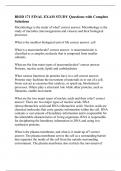Biod 171 f - Study guides, Class notes & Summaries
Looking for the best study guides, study notes and summaries about Biod 171 f? On this page you'll find 678 study documents about Biod 171 f.
Page 4 out of 678 results
Sort by
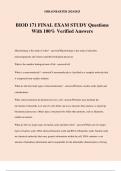
-
BIOD 171 FINAL EXAM STUDY Questions With 100% Verified Answers
- Exam (elaborations) • 20 pages • 2024
-
- $11.49
- + learn more
BIOD 171 FINAL EXAM STUDY Questions With 100% Verified Answers Microbiology is the study of what? - answerMicrobiology is the study of microbes (microorganisms and viruses) and their biological processes. What is the smallest biological unit of life - answercell What is a macromolecule? - answerA macromolecule is classified as a complex molecule that is composed from smaller subunits. What are the four main types of macromolecules? - answerProteins, nucleic acids, lipids and carbohydrate...
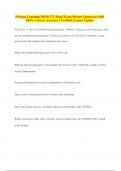
-
Portage Learning BIOD 171 Final Exam Review Questions with 100% Correct Answers | Verified | Latest Update
- Exam (elaborations) • 26 pages • 2024
- Available in package deal
-
- $11.98
- + learn more
Portage Learning BIOD 171 Final Exam Review Questions with 100% Correct Answers | Verified | Latest Update True/False. A virus is considered a microorganism. False, Viruses are not living and as such are not considered microorganisms. Viruses can, however, be classified as microbes, a more general term that includes microorganisms and viruses. What is the smallest biological unit of life? A cell What are the four main types of macromolecules found in cells? Proteins, Lipids, Nucleic Acids...
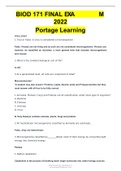
-
PORTAGE LEARNING | BIOD 171 FINAL EXAM 2022
- Exam (elaborations) • 6 pages • 2022
-
Available in package deal
-
- $18.49
- 2x sold
- + learn more
BIOD 171 FINAL EXA M 2022 Portage Learning FINAL EXAM 1. True or False: A virus is considered a microorganism. False. Viruses are not living and as such are not considered microorganisms. Viruses can, however, be classified as microbes, a more general term that includes microorganisms and viruses. 2. What is the smallest biological unit of life? A cell. 3. At a generalized level, all cells are comprised of what? Macromolecules* *A student ma...
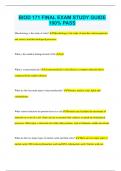
-
BIOD 171 FINAL EXAM STUDY GUIDE 100% PASS
- Exam (elaborations) • 24 pages • 2023
- Available in package deal
-
- $9.99
- + learn more
BIOD 171 FINAL EXAM STUDY GUIDE 100% PASS Microbiology is the study of what? Microbiology is the study of microbes (microorganisms and viruses) and their biological processes. What is the smallest biological unit of life cell What is a macromolecule? A macromolecule is classified as a complex molecule that is composed from smaller subunits. What are the four main types of macromolecules? Proteins, nucleic acids, lipids and carbohydrates What various functions do proteins have in a cell Prote...
Portage Learning BIOD 171 Final EXAM Questions and Answers 100%Correct Update
BIOD 171 FINAL EXAM STUDY Questions with Complete Solutions.
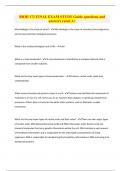
-
BIOD 171 FINAL EXAM STUDY Guide questions and answers rated A+
- Exam (elaborations) • 19 pages • 2024
-
- $10.49
- + learn more
Microbiology is the study of what? - Microbiology is the study of microbes (microorganisms and viruses) and their biological processes. What is the smallest biological unit of life - cell What is a macromolecule? - A macromolecule is classified as a complex molecule that is composed from smaller subunits. What are the four main types of macromolecules? - Proteins, nucleic acids, lipids and carbohydrates What various functions do proteins have in a cell - Proteins may facilitate the moveme...

-
BIOD 171 Final Exam (Version-3, Latest-2022) / BIOD171 Final Exam Essential Microbiology W/ Lab: Portage Learning |100 % Correct Q & A
- Exam (elaborations) • 17 pages • 2023
-
Available in package deal
-
- $11.49
- + learn more
BIOD 171 Final Exam (Version-3, Latest-2022) / BIOD171 Final Exam Essential Microbiology W/ Lab: Portage Learning |100 % Correct Q & A Algae Bacteria Amoeba Question 4 5 / 5 pts False To produce energy (ATP) Protein synthesis Ribosomes are located in the cytoplasm of prokaryotic cells and in the ER of eukaryotic cells. Lipid synthesis Protein modification and distribution Identify the following cellular components by matching the number with the description. C A. Rough endoplasmi...

-
BIOD 171 FINAL EXAM WITH 100% CORRECT QUESTIONS AND ANSWERS
- Exam (elaborations) • 18 pages • 2024
-
Available in package deal
-
- $21.49
- + learn more
BIOD 171 FINAL EXAM WITH 100% CORRECT QUESTIONS AND ANSWERS What are the three main components of carbohydrates? – ANSWER Carbohydrates are composed of carbon, hydrogen and oxygen atoms. Examples would include, C6H12O6 (glucose) C12H22O11 (sucrose) and C6H10O5 (cellulose). What is the primary difference between prokaryotic and eukaryotic cells? - ANSWEREukaryotic cells contain a nucleus, a membrane enclosed region within the cell that contains the genetic material. Prokaryotic ce...

-
Portage Learning BIOD 171 Final Exam
- Exam (elaborations) • 50 pages • 2024
-
- $13.99
- + learn more
Portage Learning BIOD 171 Final ExamTrue or False: A virus is considered a microorganism. False. Viruses are not living and as such are not considered microorganisms. Viruses can, however, be classified as microbes, a more general term that includes microorganisms and viruses. 1. What is the smallest biological unit of life? A cell. 2. At a generalized level, all cells are comprised of what? Macromolecules* *A student may also answer: Proteins, Lipids, Nucleic acids and Polysaccharides ...

How did he do that? By selling his study resources on Stuvia. Try it yourself! Discover all about earning on Stuvia




